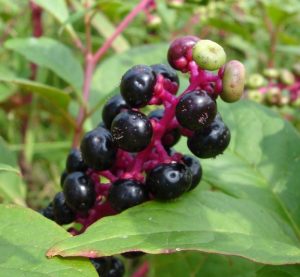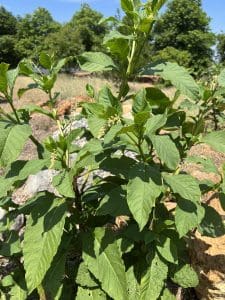
Phytolacca americana, also known as American pokeweed, pokeweed, poke sallet, or poke salad, is a poisonous, herbaceous perennial plant in the pokeweed family, environmental weed
SOUTH-WEST Western Australian residents have been asked to look out for a plant poisonous to people and livestock during Summer — the declared invasive weed pokeweed.
The Department of Primary Industries and Regional Development is beginning its annual surveillance program on 27 November, and it will continue until late January/early February 2024.
DPIRD biosecurity officer Zara Matthews said the department was undertaking the first round of surveillance and control for pokeweed on properties in and around Balingup and Mullalyup in the state’s south-west, as well targeting specific areas in Bridgetown and Pemberton.
“Now is an ideal time to identify the poisonous plant (scientific name Phytolacca americana) as it will be in flower or showing its distinctive purple-black berries,” Ms Matthews said.

Pokeweed produces white or magenta flowers. Image – DPIRD.
“DPIRD inspectors will be accessing both private and public property to look for and control all pokeweed plants prior to them setting seed this Summer.
“We appreciate the help and cooperation of landowners to eradicate and stop the spread of this toxic declared weed,” she said.
Pokeweed, including its leaves and berries, is toxic to both humans and animals and should not be eaten or handled. It is an environmental weed and can also affect agricultural activities by contaminating produce.
Pokeweed looks similar to inkweed, that is widespread in south-west WA, but grows taller – up to 2.5 metres – and has larger leaves and drooping berry stalks. It has bright green leaves up to 40cm long on a smooth purplish stem. White to magenta flowers form in elongated clusters hanging from branches.
Images to assist in the identification of pokeweed are available at agric.wa.gov.au/pokeweed and if you suspect you have seen pokeweed, take photos and make a report to DPIRD by using the MyPestGuide™ Reporter app . Do not collect the seeds, berries or leaves as they are all poisonous.
Alternatively, the department’s Pest and Disease Information Service can be reached at 9368 3080 or via email [email protected]

Funny, as I am cruising the ‘net, while cooking up a batch of poke, this article came up.
I have to beat the cattle to where the poke grows, since if they get to it first, nothing much is left for me.
Poke is actually extremely beneficial…IF you know what you are doing. Poke “salad” or “salet” is young sprouts when they first appear in Spring, cooked in three changes of water, then eaten as a tonic. The berries are excellent for rheumatism…but do NOT bite the seeds. The root itself has been successfully used as a tincture for cancers, including breast.
So…while it is technically a weed, it is still very pretty in the fall with all the berries, and it tastes mighty good. Like asparagus with a wild flare. 😉
Pokeweed is very medicinal, but also deadly if you don’t know what you are doing.
I live in West Virginia, USA. This is an excellent article. 😊
https://www.corinnawood.com/blog/poke-root-old-medicinal-uses